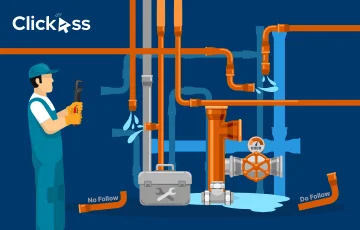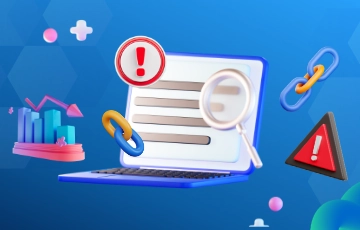🔑 Key Takeaways
- High DR means strong links, not strong rankings. A site can have great backlinks and still underperform due to weak content or SEO issues.
- DA is relative, not absolute. Your score can drop just because competitors improve, even if nothing changes on your site.
- Don’t chase the score. DR and DA are indicators, not end goals. Use them to spot gaps and steer strategy, not as targets to hit.
Domain Rating (DR) and Domain Authority (DA) both use a 0–100 scale, but they’re built by different tools and measure very different things—yet many still treat them like they’re interchangeable.
That’s where the trouble starts.
In this guide, we’re breaking down the basics of domain rating vs domain authority, explaining what each score measures, and showing how to use them in your SEO strategy.
Understanding Domain Rating (DR) and Domain Authority (DA)
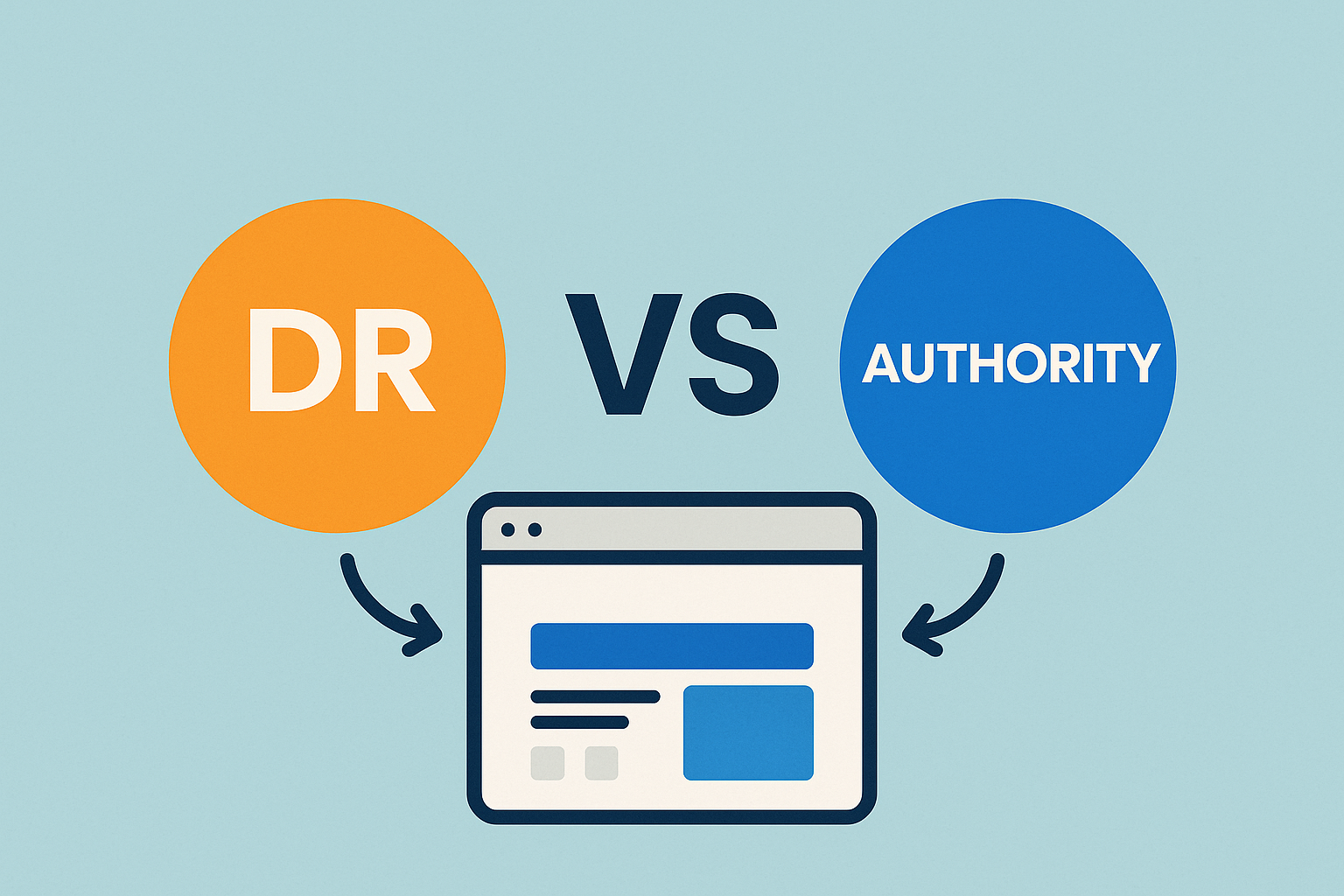
If you’ve ever wondered why two different tools give your site very different authority scores, here’s your answer:
What is Domain Rating (DR)?

Ahrefs introduced Domain Rating to make backlink evaluation simpler. It’s a score from 0 to 100 that reflects the strength of a site’s backlink profile, nothing else.
FYI: DR doesn’t factor in traffic, keyword rankings, or content quality. It’s purely about links.
Let’s say a small niche site picks up backlinks from high-authority domains like Forbes, TechCrunch, and Adobe’s blog. Even if that site has low traffic or thin content, its DR can jump dramatically.
That’s because Ahrefs measures how many unique domains are linking to you, how authoritative those domains are, and how many other sites they’re linking to.
The more valuable the referring domains, the stronger your DR.
That’s why DR is often used during link-building campaigns.
Agencies and SEOs look for high-DR sites to pitch guest posts or partnerships, because those backlinks tend to carry more weight.
Why DR Can Be a Vanity Metric (Real Example)
📌FYI: High DR sites can still have thin or irrelevant content. Don’t confuse backlink volume with topical authority. Some DR 70+ domains are general-purpose blogs that rank for nothing meaningful in your niche. A well-placed link on a lower-DR, niche-relevant site often drives more ranking value than a generic “authority” backlink. |
What is Domain Authority (DA)?
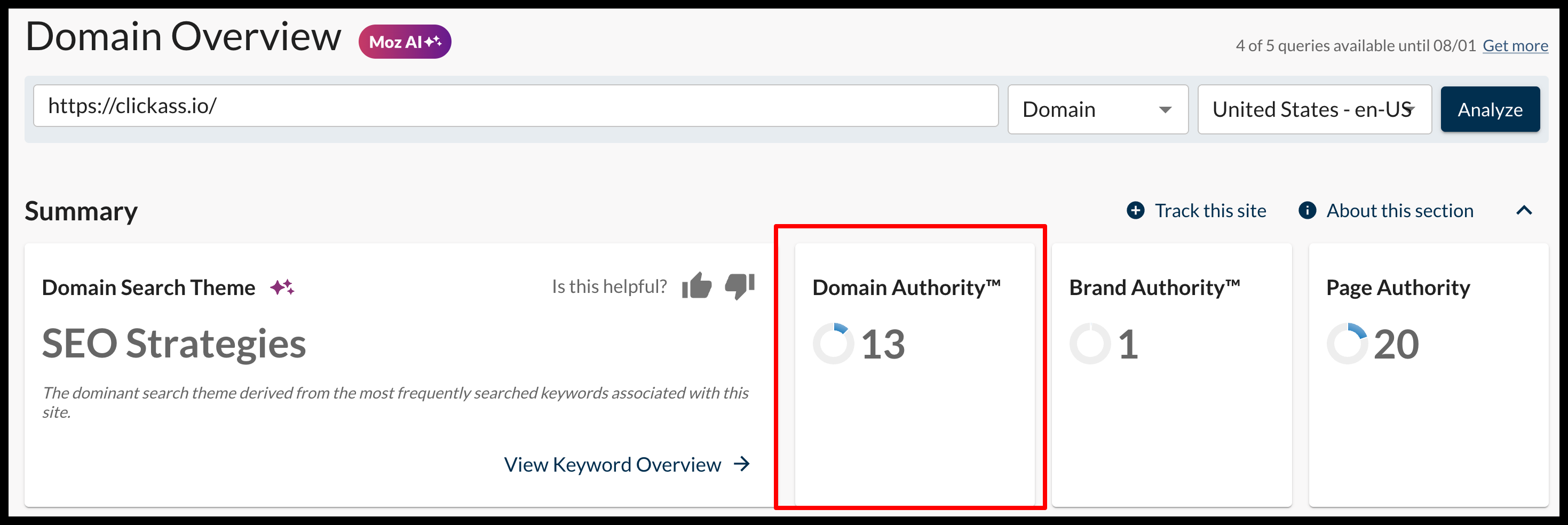
Domain Authority, while also scored out of 100, looks at a much broader picture.
It’s not just about backlinks; it’s about a domain’s overall ability to rank against others in search results.
That includes things like:
- How many unique domains link to it
- How trustworthy those links are
- How often does the site show up in SERPs
- How spammy the link profile looks
Take a five-year-old site that consistently ranks for dozens of keywords, gets links from blogs and news sites, and has low spam signals.
Even if it doesn’t have as many backlinks as a competitor, it can still score a higher DA.
📌FYI:DA fluctuations don’t always reflect your performance. Because DA is a comparative score across Moz’s entire index, a drop might have nothing to do with your site. If several large sites in your category improve, your DA could fall, even if your rankings go up. |
Key Differences Between DR and DA
It’s easy to assume that Domain Rating and Domain Authority measure the same thing.
But, here’s how they stack up and differ:
Aspect | Domain Rating (DR) | Domain Authority (DA) |
Metric Developer | Built by Ahrefs, primarily for evaluating backlink strength | Created by Moz, aimed at predicting search ranking potential |
Core Focus | Measures the quantity and quality of referring domains only | Evaluates overall SEO strength using a blend of link data, domain signals, and trust |
Data Dependency | Tied directly to backlink profile strength, without considering on-site SEO | Accounts for multiple variables like spam score, root domains, and search visibility |
Update Frequency | Updates frequently, often daily, with new or lost backlinks | Updates periodically, with broader changes reflected in batch cycles |
Use Case | Best for evaluating link-building prospects and vetting referring domains | Ideal for competitor benchmarking and estimating the domain’s ability to rank in Google |
Responsiveness | Highly sensitive to backlink gains/losses, making it great for tracking link ROI | More stable over time, but slower to reflect sudden changes in link profile or traffic |
Limitations | Doesn’t factor in site structure, content quality, or keyword rankings | May lag behind recent SEO changes, and scores can fluctuate due to index shifts |
🎬 DA vs DR: Big SEO Mismatch
🎯 Bonus Read: Discover how Link Velocity interacts with DR growth patterns and Google trust.
And while they often point in the same direction, there are plenty of cases where they diverge, and that’s when things get interesting.
For instance:
- Backlink-heavy sites can look better on DR: A site that earns tons of high-quality backlinks through PR pushes or viral content can score a strong DR, even if it doesn’t rank well or hasn’t optimized for keywords.
- DA favors steady, aged domains with SEO history: A site that’s been publishing solid content for years, earning natural links, and keeping a clean technical profile might rank high in DA even if it hasn’t earned flashy new backlinks recently. Moz’s model rewards historical consistency.
- DA gives context against competitors: Because DA is built on a comparative model, a drop doesn’t always mean you’ve done something wrong; it might just mean your competitors did something better.
To get a clearer picture of true domain quality, many SEOs also look at trust-based signals like TrustRank, which evaluate how closely a site is connected to other trusted sources.
🧠 Expert Insight:DR and DA are easier to grow from 10 to 30 than from 50 to 60. Because both use logarithmic scales, early gains come faster. But once you cross into mid-tier or high-authority territory, every additional point gets harder. This is why link-building campaigns often show “slower” progress later—your efforts aren’t wasted; the scale is just tighter. |
What the SEO Community Says About DR vs DA
If you’ve ever scrolled through Reddit or SEO Twitter, you’ll know this debate runs deep.
SEOs use both DR and DA—but not always for the same reasons.
Here’s how the community breaks it down, based on real discussions and hot takes.
💬 Domain Rating (DR)
What it is:
Ahrefs’ way of scoring your backlink profile. More (and better) unique domains = higher DR.
Why SEOs like it:
It updates fast and tracks link-building wins clearly.
What Redditors say:
“DR is your site’s overall rating. UR is for a specific page.”
“Ahrefs DR is helpful when you’re pitching or doing link swaps.”
Community Tips:
Build high-authority backlinks consistently.
Watch your DR to track link-building ROI.
💬 Domain Authority (DA)
What it is:
Moz’s attempt to measure a domain’s ranking potential, not just its links.
Why SEOs are divided:
It’s great for benchmarking—but slower to reflect progress.
What Redditors say:
“DA is a vanity metric Moz created to mimic PageRank.”
“DA still works well for tracking long-term SEO health.”
Community Tips:
Focus on publishing value-packed content.
Improve technical SEO and user experience—it all adds up in DA.
⚖️ Key Community Takeaways
Use both metrics together: DR shows your link profile strength; DA reveals your site’s trust and visibility.
Neither is used by Google: They’re proxies—not ranking signals.
Quality > quantity: Chasing numbers won’t work if the links or content suck.
💡 Bottom line: Treat DR and DA like dashboards, not KPIs. They help you track trends—not define your strategy.
Practical Applications of DR and DA in SEO
DR and DA become valuable not because they exist, but because they help drive smarter decisions.
Here are the three most practical applications of DR and DA in SEO:
1. Using DR and DA for Competitor Analysis
One of the most effective ways to apply these metrics is during a competitive audit.
If your site’s DA is 27 and every page ranking on page one has a DA over 50, that’s a signal. You’re not just behind in content—your overall domain strength needs work.
The same goes for DR. Let’s say you notice a competitor with a DR of 65 consistently outranking your DR 40 site, even when your content is fresher.
A peek at their backlink profile might reveal partnerships, guest post placements, or mentions on news sites that you’re missing.
If you’re competing with Seobility, you’ll notice they rank consistently—even for “Best SEO tools” listicles—because of constant mentions across roundup blogs and review aggregators.
Their backlink profile includes 33 DR80+ links, giving them a huge authority edge in competitive SERPs.
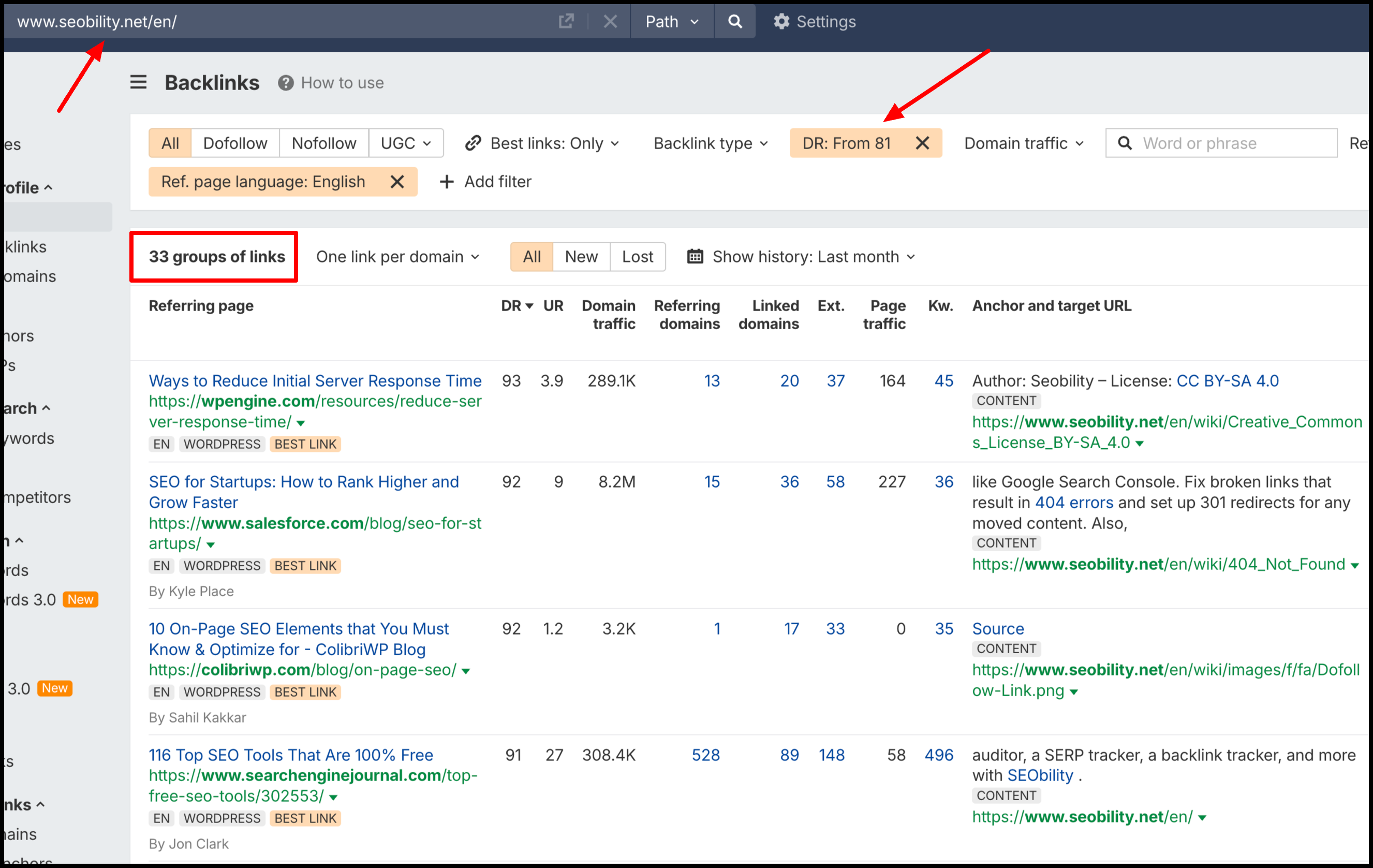
Often, this advantage comes down to stronger link popularity—a measure of how many and how authoritative the sites linking to them are.
It’s not just about quantity; it’s about how influential those backlinks are in the SEO ecosystem.
🧠Expert insight:DR helps you measure how, DA tells you where. Together, they show why someone’s outranking you—and what you can do about it. |
2. Leveraging DR and DA in Link Building
Backlinks still carry weight, but not all links are equal. During your link-building efforts, DR and DA help you separate high-impact targets from the noise.
A site with DR 70 and DA 65 has a strong backlink profile and a solid presence in search.
Getting a link from that domain can pass both authority and credibility to your site. In contrast, a domain with a DR 10—even if it looks “nice” on the surface—isn’t likely to move the needle.
Here’s where strategy kicks in:
- DR helps you vet link strength. A DR 80 domain is probably linked to by thousands of reputable sites.
- DA shows its ranking muscle. A DA 60 site is ranking well across multiple keywords, meaning Google sees it as trustworthy.
If you’re prioritizing guest post outreach, link insertions, or digital PR campaigns, start with domains that score high on both metrics.
| 📚Read more: 20+ Link Building Benefits for SEO Mastery and Growth |
3. Monitoring SEO Progress
If you’re running long-term SEO campaigns and not tracking link building KPIs like DR or DA, you’re missing critical feedback.
Both metrics serve as reliable benchmarks over time and are vital to consistent backlink tracking.
Both metrics serve as reliable benchmarks over time.
- If your DR climbs from 20 to 40 over six months, that usually reflects real backlink wins—assuming they’re quality links.
- If your DA rises gradually alongside it, that suggests your overall site strength is improving in search visibility.
Let’s say you’ve been investing in weekly guest posts, fixing broken links, and refreshing old content.
After 90 days, your DR ticks up, but DA stays flat. That’s a cue to review technical SEO, page structure, or keyword targeting—areas DA considers that DR ignores.
Real Insight from Clickass
At Clickass, we recently saw our DR jump from 10 to 12 after a few targeted backlinks. But nothing new was getting indexed.
If your situation mirrors this, it’s a signal—strong links alone aren’t enough.
That’s why we’re running a full indexing audit and tightening our internal linking strategy to guide Google through the right pages.
| 📚Read more: Link Building Checklist (2025): Smart Strategies for SEO Pros |
How to Check Domain Rating/Authority
Both Ahrefs and Moz offer free tools that give you a quick read on where your domain stands—and how it compares to others in your space. Let’s dig deeper into it:
1. Ahrefs Website Authority Checker
Ahrefs makes it easy to check your Domain Rating and get a quick snapshot of your backlink profile.
This tool is especially useful when evaluating link-building targets or tracking your own link equity.
It also provides insights into URL Rating (UR), which measures the strength of a specific page based on its backlinks—helping you understand not just domain-level authority but also page-level power.
To use it:
- Go to the Ahrefs Website Authority Checker.
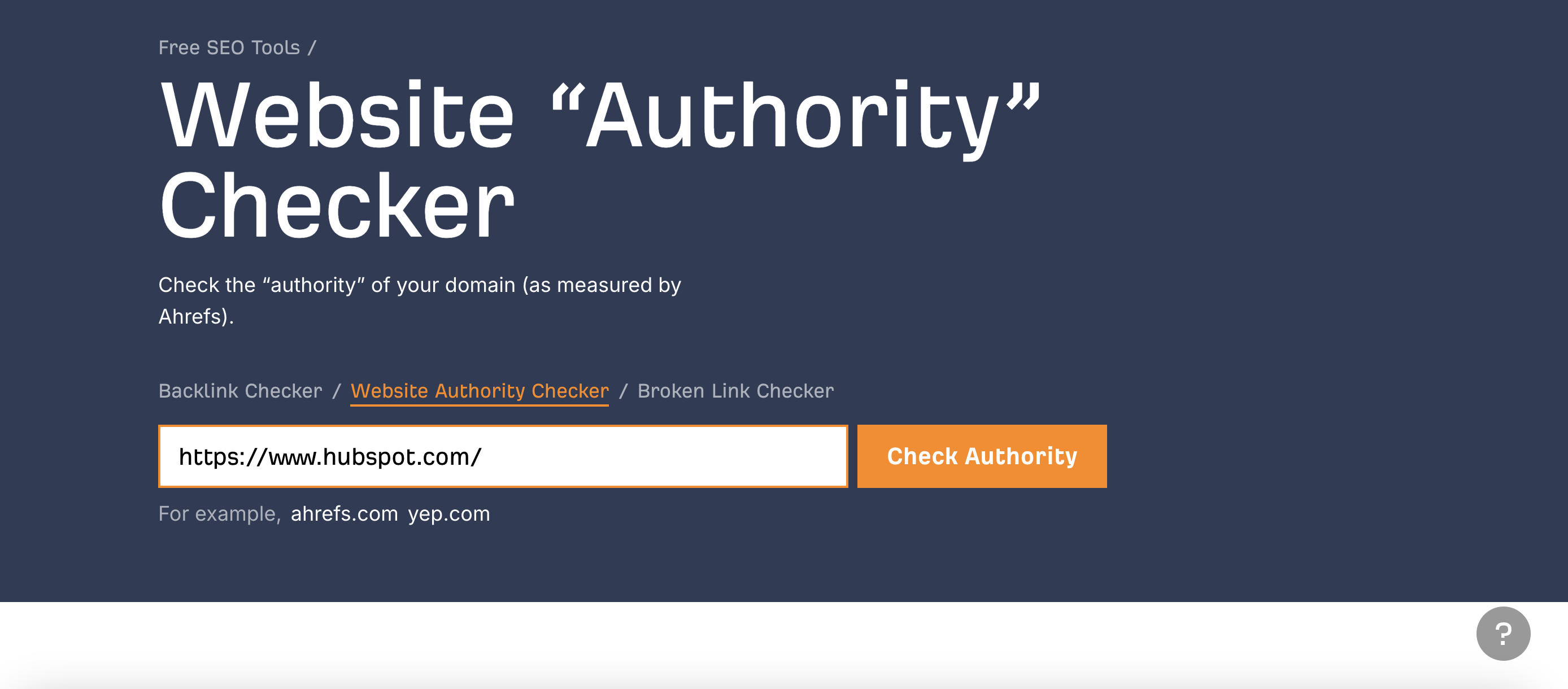
- Enter your domain (e.g. yourdomain.com).
- Click on “Check Authority”.
- Review your DR score, total backlinks, and number of referring domains.

2. Moz Domain SEO Analysis Tool
Moz’s tool is ideal for checking your Domain Authority and understanding your SEO performance across multiple ranking factors. It goes deeper than just links and offers keyword and competitor data, too.
To use it:
- Go to the Moz Domain Analysis Tool.
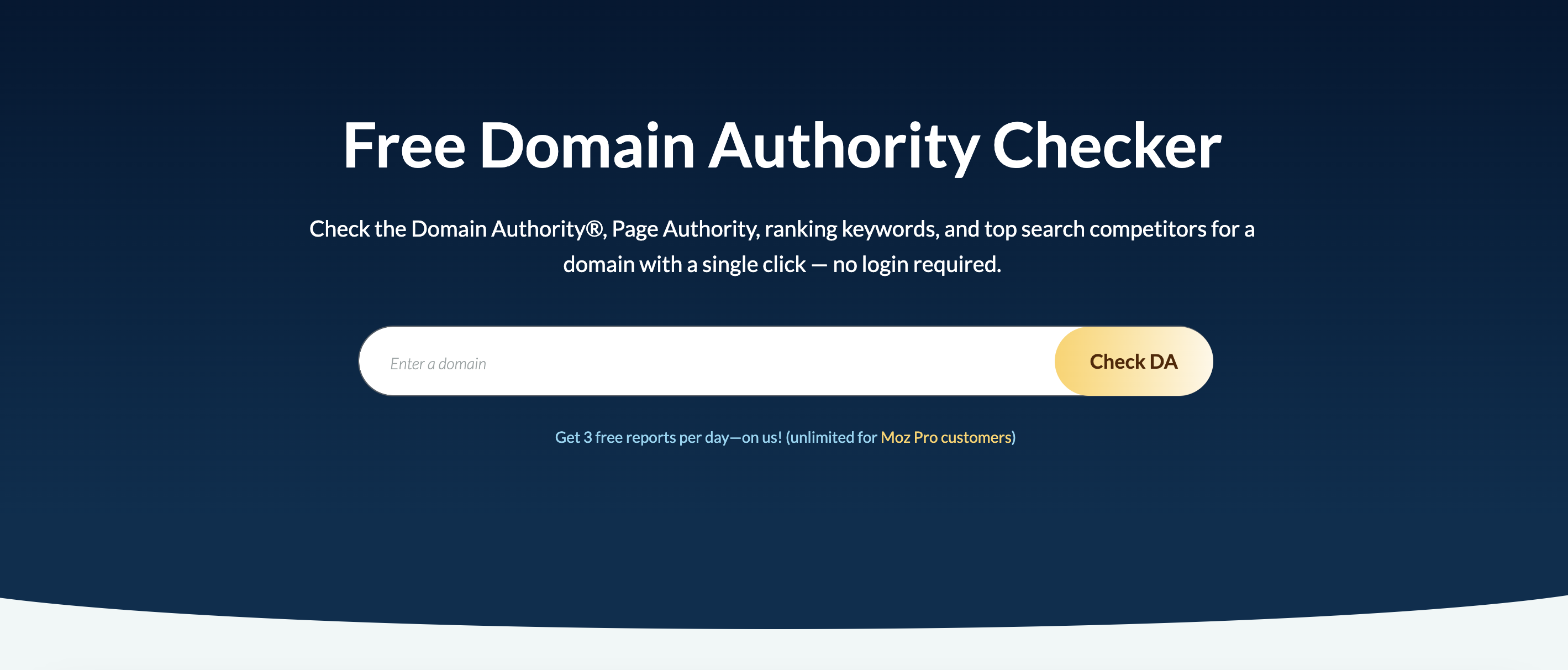
- Type in your domain.
- Click on “Check DA”.
- View your DA score, number of linking root domains, top ranking keywords, and spam score.
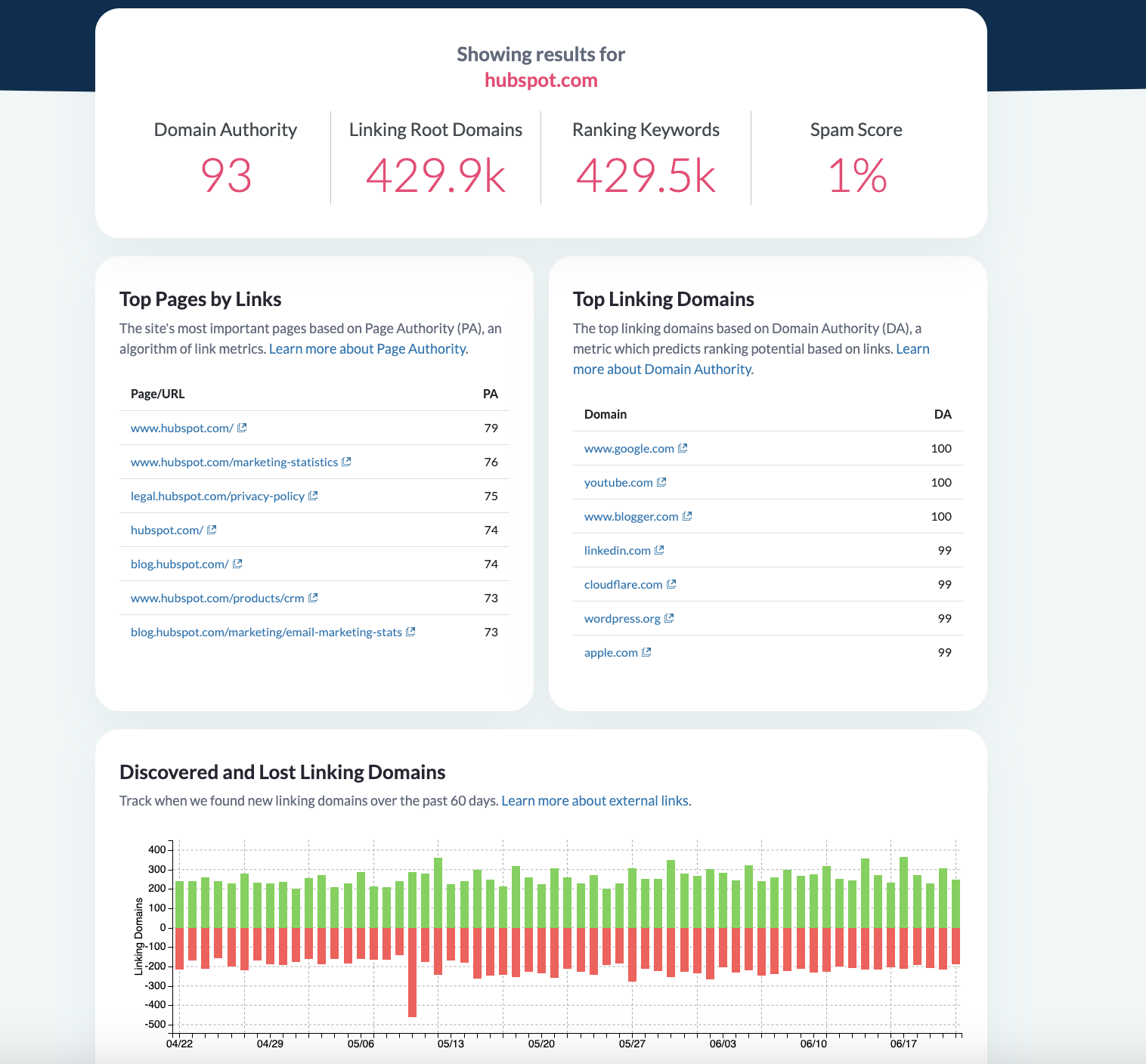
- Scroll down for insights on featured snippets, top pages, and top linking domains.
Start Building Authority That Ranks
Understanding Domain Rating vs Domain Authority is just the start.
The real value comes from applying these insights to your strategy—choosing better link targets, benchmarking smarter, and tracking progress with intent.
Ready to enhance your SEO strategy?
Get our Link Building Sample Sheet to uncover high-authority sites and improve your DR and DA scores effectively.
FAQs
- Can DR and DA scores differ significantly for the same website?
Yes—they’re based on different algorithms, databases, and scoring models, so it’s normal to see a gap between the two.
- How often should I check my website’s DR and DA?
Monthly or quarterly check-ins work well for spotting trends and measuring the impact of your SEO efforts.
- Is it possible to improve DR and DA simultaneously?
Absolutely. Strong content, clean technical SEO, and consistent backlink building can move both scores upward over time.
- Should I prioritize DR or DA when evaluating link opportunities?
Ideally, look at both. DR reveals link strength, while DA gives context about a domain’s search presence.
- Are there tools available to check DR and DA scores?
Yes—use Ahrefs for DR and Moz for DA. Both offer free tools that give you a snapshot of site authority.
About The Author
Sanjoli Jain
Content writer and strategist with over 5 years of experience helping SaaS brands grow through research-backed storytelling and SEO. I enjoy unpacking dense SEO topics and shaping them into content that moves the needle. You'll always find me chasing the sweet spot between clarity, strategy, and search performance.
Table of Contents
ToggleRelated Posts
SaaS SEO Mistakes That Hurt Growth Even When You Rank
SaaS Link Building Playbook for Faster SEO Wins
How to Choose the Right White Label Link Building Partner for Your SaaS SEO Agency
Forum Backlinks in 2025: Strategy, Risks & Truth
13 Cold Email Tweaks That Improved Backlink Outreach (Backed by Experts)
Domain Rating vs Domain Authority – What SEOs Should Focus On
Leading White Label Backlink Services: Ranked & Reviewed
Relevant Links Guide: Master Contextual Backlinks Today
Manual Link Building in 2025: A Human-First Guide
Contextual Link Building in 2025: A Practical SEO Guide That Works
Mastering International Link Building in 2025
Beyond DR: Real Link Building Metrics That Actually Work
10 Proven Ways to Sell Backlinks and Earn $30K a Year
How To Earn Natural Backlinks Without Cold Emails
The Ultimate Guide to Organic Link Building in 2025: Future-Proof Your SEO
Top AI-Powered Link Building Trends for 2025 [From 15 Experts]
Link Prospecting Guide: Find High-Quality Backlinks
Inbound Link: What it is & How It Affects Your SEO Rankings?
Backlink Management Guide: Unlocking Top Tools and Strategies
CTR Manipulation: Discover Ethical SEO Alternatives
Niche Relevant Backlinks: Comprehensive Guide (2025)
White Label Link Building 101: A Guide for SEO Agencies
10+ Niche Driven SEO Strategies to Boost Your Traffic & Revenue
How to Check Who Links to My Site Or Any Site for Better SEO?
What Are Editorial Links? (+ How to Earn Them)
Link Building Checklist (2025): Smart Strategies for SEO Pros
20+ Link Building Benefits for SEO Mastery and Growth
Unlocking the Power of Reciprocal Links in 2025: Strategies for SEO Success
13 Link Building Challenges & How to Overcome Them
16 Link Building Mistakes to Avoid in 2024
What Are PBN Backlinks? (And Why You Shouldn’t Use Them)
Analyzing Your Backlink Profile for SEO & 2 Perfect Examples
10 Ways to Index Backlinks Faster in 2024
Nofollow vs. Dofollow Backlinks: Understanding Their SEO Implications
Tiered Link Building: Everything You Need to Know
What is Link Equity and How Is It Determined?
Link Building 101: Master The Basics and Beyond
The Power of Backlinks: Why They Are Essential for SEO Success
Link Insertion: How to Do it with $0 Investment?
Everything You Need to Know About Link Farming
9 Underrated Techniques to Get High Authority Backlinks in 2024
Doorway Page Explained: Ultimate Effects on SEO And Rankings
Top of Funnel Marketing For SaaS: Strategies, Measurement, and Examples
Link Building Outsourcing: The Definitive Guide [2023]
8 Cost-Effective Ways to Get You Higher Search Engine Rankings
An Ultimate Guide to Growth Marketing




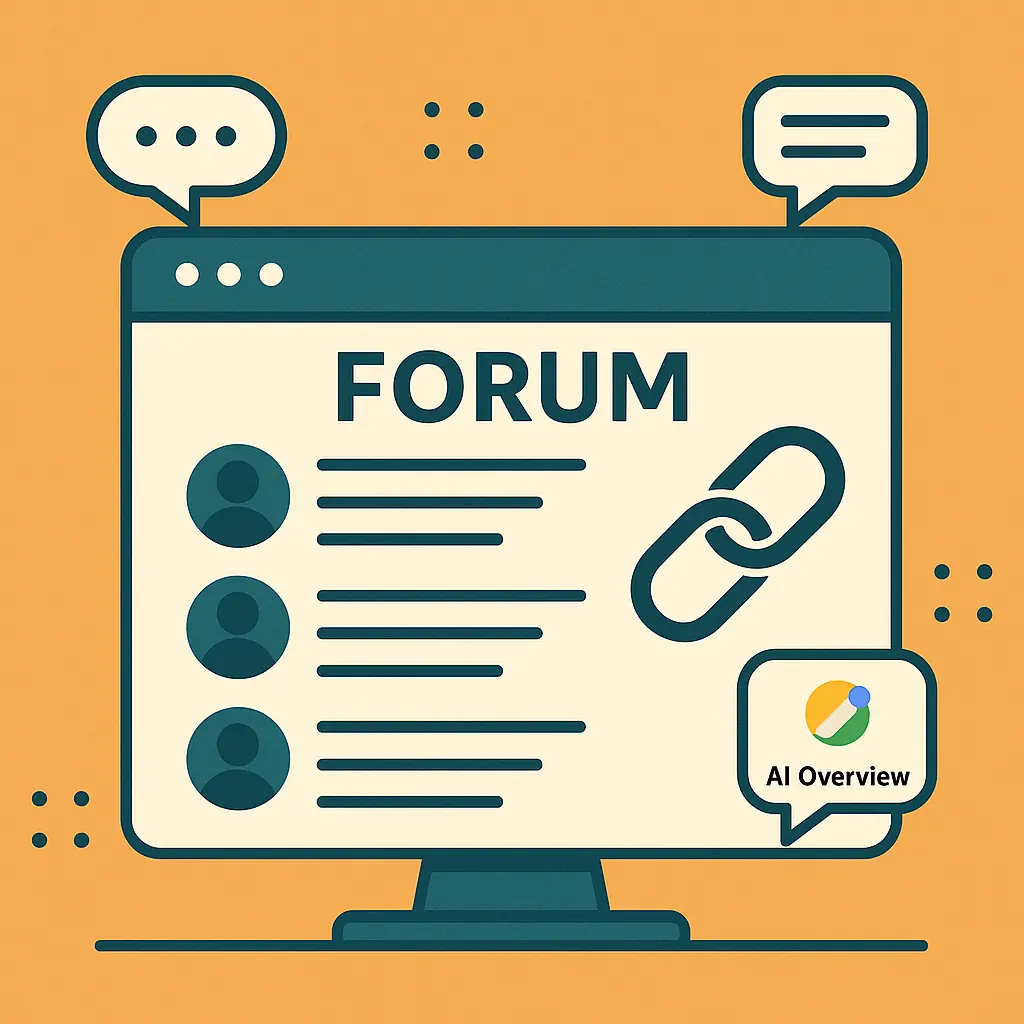




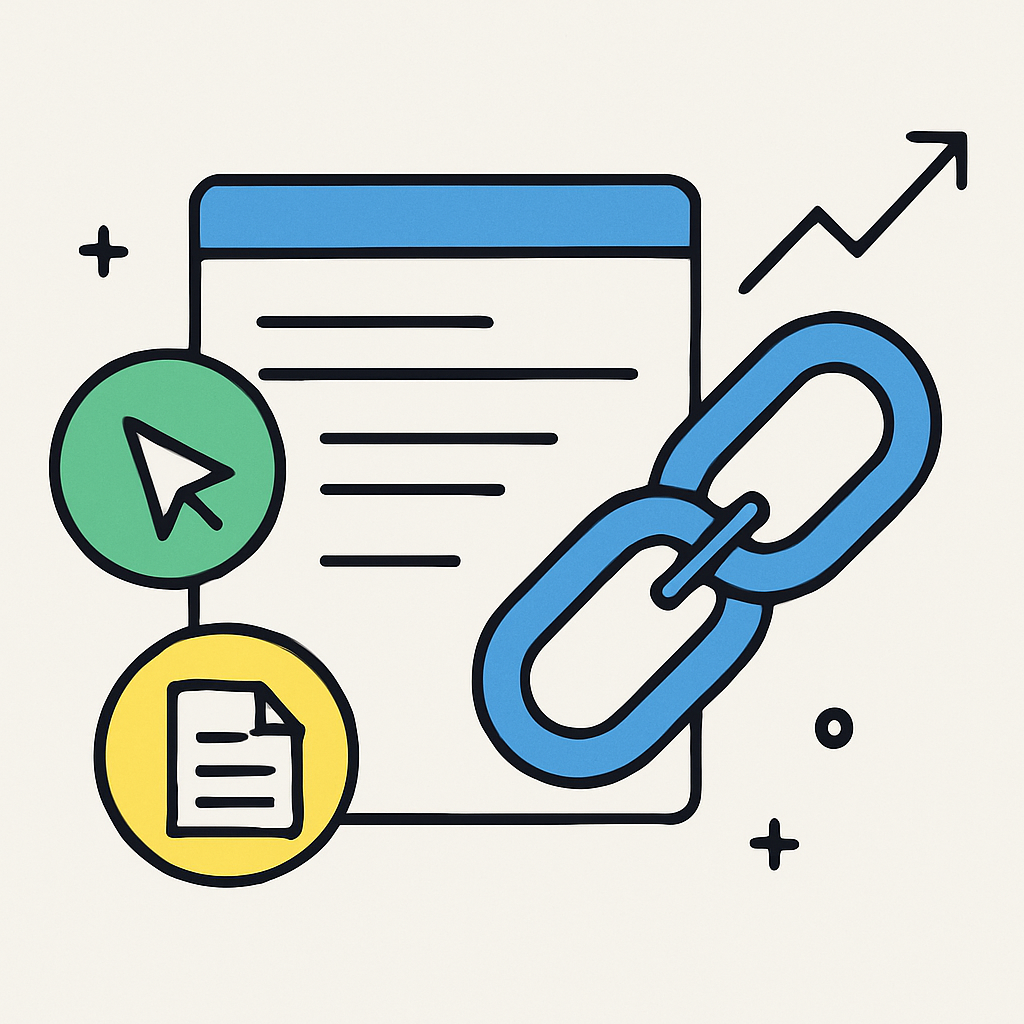


















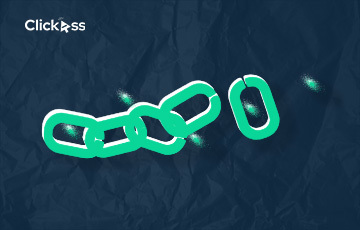


![Backlink Profile: Analysis + [2 Perfect Examples]](https://clickass.io/wp-content/uploads/2024/01/Examples-of-Perfect-Backlink-Profile3-1.webp)

